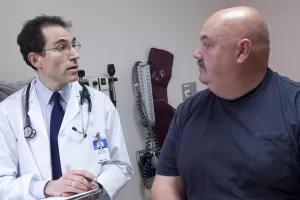The thyroid gland is a butterfly-shaped organ in your neck that releases hormones to regulate many of your body’s functions, like your metabolism. So, when your thyroid isn’t working properly, it can lead to conditions like hypothyroidism, hyperthyroidism or even forms of thyroid cancer.
Pioneering treatments in thyroid care
Thyroid diseases are lifelong but manageable. When you're looking for a healthcare partner to support you through the years, the Tufts Medicine team will be by your side.
For more than 80 years, we've provided the best treatments — and we've helped discover many of them. Some of our breakthroughs include:
- Developing anti-thyroid drugs for hyperthyroidism
- Using thyroid hormone therapy to treat both benign and cancerous thyroid nodules

Conditions
Whether you have a confirmed thyroid condition or suspect that your health may be off, you can turn to our expert endocrinologists to treat the following:
Testing
The key to finding the right treatment for your thyroid condition is by first understanding the root of the problem. Often, thyroid growths or nodules are benign (noncancerous).
And when it comes to your thyroid health, you deserve the most accurate and safest testing available to biopsy nodules or growths in your thyroid.
We can also screen for a range of hormone-related disorders that can cause thyroid problems.
Fine needle aspiration (FNA)
A fine needle aspiration (FNA) is a non-invasive procedure that’s a smart alternative to surgery. This procedure lets us quickly determine whether the thyroid growth or nodule is benign (noncancerous) or malignant (cancerous).
What happens during an FNA procedure?
Make sure to set aside one hour in your day for this practically pain-free procedure. During an FNA procedure, your doctor will use an ultrasound to guide a thin needle into the nodule and remove a few cells.
How will doctors analyze my biopsy from my FNA procedure?
Your doctor will review each biopsy with a pathologist specializing in endocrine tumors. If your biopsy results come back cancer-free, we’ll make simple recommendations for follow-up care.
Treatments
Catching thyroid disease early allows us to treat your condition before symptoms even surface. And suppose it's determined that you're living with thyroid cancer. In that case, your doctor will work closely with our colleagues in head and neck surgery, oncology, radiology, pathology and nuclear medicine to map out a plan that reflects the following:
- How advanced your thyroid cancer is
- The type of thyroid cancer
- Your overall health
Medication management
We can often treat hyperthyroidism and hypothyroidism with medication. The goal is to balance the amount of thyroid hormones your body produces.
Radioactive iodine therapy
People living with hyperthyroidism or thyroid cancer can benefit from radioactive iodine therapy because it can tame the thyroid's overactive cell production. When these cells multiply out of control, growths and nodules can cluster on the thyroid, enlarging it from its healthy size.
Radioactive iodine therapy is designed to destroy overactive thyroid cells and any cancerous tissue by shrinking the enlarged thyroid.

From regular office visits to inpatient stays, find the healthcare you need and deserve close to home.

Meet the doctors and care team devoted to supporting you every step of the way along your path to better health.